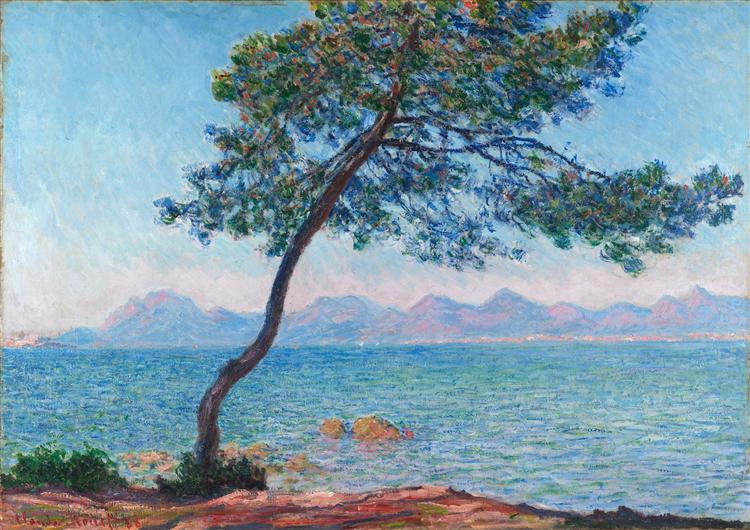説明
Claude Monet's painting "The Esterel Mountains" (1888) is a work that encapsulates the essence of Impressionism, a movement that Monet himself helped define and popularize. Exercising his mastery in capturing light and color, Monet presents us with a landscape that transcends the merely representative and invites us to experience nature in its most vivid and ephemeral form.
Looking at the composition, we are faced with a solid plane of mountains made up of vibrant red and terracotta hues, which stand out against the azure sky and scattered cottony clouds that add a touch of dynamism to the scene. These warm colours not only evoke the volcanic geology of the Esterel region in France, but also create an atmosphere of warmth and closeness, integrating the viewer into the experience of the landscape. The mountains rise monumentally in the background, monochromatic in their structure with nuances suggesting their volume and texture, highlighting Monet’s preference for depicting nature through brushstrokes that capture the changing light and variations in the weather.
Another significant aspect of the work is the use of light. The lighting in “The Esterel Mountains” is almost theatrical; it shapes the mountains and elevates them to an almost mystical dimension. Monet, true to his style, employs a technique of quick, bold brushstrokes, allowing the light to bounce off the shadows of the rocks and highlight the ridges. This is where the influence of his meticulous study of color is noticeable: the shades of orange and red that define the mountains are counterbalanced by the blues and violets of the sky, creating a visual tension that is both stimulating and harmonious.
Exploring this work, you realise that Monet was not interested in faithfully depicting the scene. There are no human figures in the painting; instead, the focus is exclusively on nature. This is emblematic of his impressionist approach, which prioritises the perception of landscape and light effects over figurative narrative. The absence of characters invites the viewer to contemplate and reflect; they become part of the composition, feeling the landscape on a visceral level.
"The Esterel Mountains" is part of a series of works that Monet painted in the region, where he captured the scenic beauty of the surroundings. These works reflect his ongoing quest to understand the interplay between light and nature. Monet, like other Impressionists, challenged the artistic conventions of his time, prioritizing subjective visual experience over accurate representation.
As the observations draw to a close, it becomes clear that The Esterel Mountains is not just a landscape; it is a dialogue between the artist and his surroundings, resulting in a harmony that makes us partakers of the ephemeral beauty of nature. This 1888 work is a testament to the evolution of Monet's style, encapsulating his unique ability to transform a visual moment into an explosion of color and emotion, which continues to resonate with viewers today. As we stand before this painting, we are reminded that within the simplicity of a landscape can lie a world of complexity.
KUADROS ©, a famous painting on your wall.
Hand-made oil painting reproductions, with the quality of professional artists and the distinctive seal of KUADROS ©.
Painting reproduction service with satisfaction guarantee. If you are not completely satisfied with the replica of your painting, we will refund 100% of your money.

